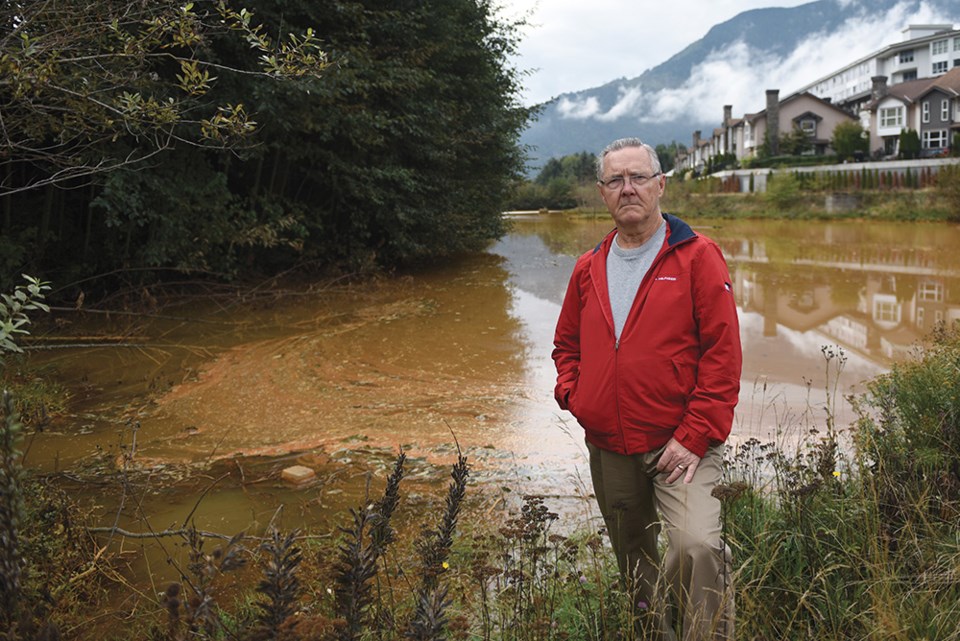Residents living close to the “stinky pond” at Main Street and Third Avenue say it’s past due for the District to “drain the swamp.”
It’s not a political catchphrase – they’re merely tired of the rotten egg smell and unsightly colour of the standing water near the Aqua housing project.
The area’s developer intended the pond to be an extension of the estuary – a tidal wetland with fish access and stormwater storage. The developer went into foreclosure in 2008, and the artificial waterway deepened and turned into a pond.
The Third Avenue stormwater management pond serves two purposes, according to the District.
"It removes sediment from the stormwater system that serves a large part of the downtown area before the water is discharged to the estuary, and it serves as a 'buffer' to collect stormwater during high tides," a District spokesperson told The Chief in an email.
The original design is easy to see – the pond has grassy juttis facing the homes, which might have been pleasant spots to have a picnic if the original plan had come to fruition.
Instead, Main Street resident Bill Cavanagh said it’s become a smelly eyesore that collects runoff from downtown Squamish and threatens the nearby estuary.
“They need a long term solution,” he said.
Cavanagh said the pond wasn’t always orange – he moved in five years ago and describes it as being grey-green most of the time.
Recent construction on Vancouver Street involved draining groundwater and running it back into the pond, turning the entire waterbody a bright orange with visible oil and debris floating on top.
The orange colour is caused by a high iron-level, but the water and smell itself is not a health hazard to humans, according to the District.
The water being drained, according to their tests, has too high a turbidity to be released into “fish bearing waters.” Since the pond does not sustain fish life, the water can be drained into it.
On a cool, breezy day the smell doesn’t make much of an impact. But on still, hot days earlier this summer the strong smell of rotten eggs was unmistakable for people living nearby.
“This thing stinks, all summer,” said Cavanagh. “These people can’t sit in their backyards or open their windows all summer, because it stinks and it’s horrible.”
Cavanagh said many residents in the Aqua development are concerned about the effect the pond has on their property values. He said a few have considered suing the District, but no legal challenges have been launched so far.
A small brook along the Sea to Sky Connector Trail have also began to run bright orange, after a similar draining process was taken on nearby Loggers Lane.
Cavanagh said he finds the state of the brook “disgusting” and is concerned about the effect the orange sludge could have on plants and fish.
The pond near the Aqua development has sat untouched for close to eight years, since the developer went into receivership.
A new development company, SVR Investments, was approved to complete the project and has committed $25,000 towards improving the pond.
A budget of $400,000 has been identified by the District to install an oil and water separator and conduct a study for a long-term solution in 2018.
"The latter project would both examine the effectiveness of the sediment removal, and look to understand and address the odour issue," a District spokesperson said.
An additional $100,000 is earmarked in 2019 for further upgrades, but the District doesn’t know what those would be yet.
"It is important to note that further required upgrades may be costly to implement," the spokesperson told The Chief.
" Any subsequent work following the proposed 2018 projects may therefore take some time to resolve and a phased improvement approach may be necessary."
Local conservationist John Buchanan said whatever is done to the pond, it’s important to isolate the work from the nearby fish-bearing Bridge Pond area. He was concerned during the groundwater draining on Vancouver Street that disturbing the pond could cause the water to overflow.
After a long smelly summer, Cavanagh said the pace of the fix is too late and too slow. “It’s impossible for the town to fix, they have to completely eliminate it, because you can’t fix it,” said Cavanagh. “Close it, fill it.”
**Please note that this story has been updated to include information from the District that arrived after print press deadline.



